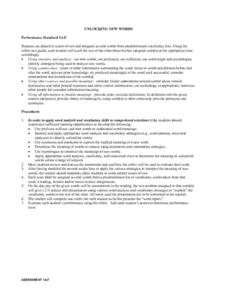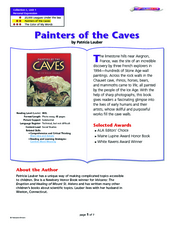Curated OER
Romeo and Juliet by William Shakespeare
"It is my lady, O, It is my Love!" Provide class members an opportunity to develop their skills reading difficult text with an exercise that focuses on the balcony scene from Romeo and Juliet (Act II, scene ii). Using the provided...
Curated OER
Northwest Coast Indians: Winter Celebrations Potlatch
Upper elementary learners engage in a study about the Potlatch as a Northwest Coast Indians social custom. Groups of pupils plan their own Potlatch ceremony; incorporating activities and creating gifts much like the ones that the Indians...
Curated OER
Unlocking New Words: Partner Presentations
Following extensive modeling about how to apply word analysis and vocabulary skills to learn new words, partner teams create brief word presentations to teach new vocabulary to the class. Preselect words from upcoming social studies,...
Curated OER
Carnival of the Animals and Aquarium and Magic Fish
Engage little learners in this moderately developed three-lesson unit on the composer Camille Saint-Saens and his piece "The Carnival of Animals." Each lesson includes a listening, discussion, and an art project to engage your class in...
Curated OER
Advertising in the Contemporary World: An Introduction to Persuasive Texts
Beginning a persuasive writing unit with your middle schoolers? Approach it through something that persuades us all: advertising! Through studying video and print advertisement, your class will practice Common Core skills for reading...
Curated OER
Sense, Sensibility and Sentences: Examining and Writing Memorable Lines
Involve your readers in finding works of literary genius. Have each individual write down compelling sentences that they read or hear, whether in a newspaper, advertisement, book, movie, song, or any other place! Once each person has a...
EngageNY
Continued Close Reading of Bullfrog at Magnolia Circle: Text-Dependent Questions and Vivid Words and Phrases
In the third activity from this unit based on the book Bullfrog at Magnolia Circle, learners focus on using specific details from the text-to-answer questions about the habitat of bullfrogs. While reading the text, young scholars are...
Curated OER
Noteworthy?
Why do we have CliffsNotes? SparkNotes? Middle and high schoolers examine arguments for and against the recent influx of book notes, or study guides. They stage a debate in which they represent Advocates For or Critics Against the use of...
Curated OER
College or Bust?
Based on a New York Times article, "The College Drop-Out Boom," participants in a fishbowl discussion formulate and express opinions about the correlation between level of education, career options, and economic mobility. Ample...
Curated OER
Redistricting: Drawing the Lines
Difficult redistricting concepts are covered in a context that will make it understandable to your government scholars. They begin with a KWL on the term redistricting and then watch a video to answer some questions. They analyze...
Curated OER
Denial on Trial
What is the "Faurisson Affair”? What is “Holocaust Revisionism”? What does freedom of speech entail? Do revisionists have a right to voice their ideas? Such questions are at the heart of a richly detailed, thought provoking lesson...
Curated OER
Juan Verdades
Cement comprehension skills using the strategies in this activity. After reading the story, Juan Verdades by Joe Hays, learners use context clues to answer questions, identify main ideas and details, and sequence events.
EngageNY
Developing Reading Fluency: Criteria for Reading Aloud
Third graders develop their reading superpowers in a lesson plan on fluency. After first listening to an audio recording or teacher read aloud, the class works together identifying criteria for fluent reading, focusing on phrasing, rate,...
Curated OER
Unforgettable...
Middle and high schoolers remember their most memorable experiences, and then connect their own narrative with an exposition about the topic associated with their experience. This New York Times instructional activity would be a great...
Curated OER
What a Relief!
How are disasters addressed by the Federal Government? This New York Times lesson, based on the article "Disaster Aid: The Mix of Mercy and Politics," prompts middle schoolers to discuss the idea of using a disaster declaration as a...
Curated OER
Character Traits in Fables
Combining art, music, dance, and reading comprehension, this lesson is geared to reach all ability levels. After reading a variety of fables and discussing story elements and character traits, class members select a moral to use as the...
Curated OER
Painter of the Caves
What a great lesson! Learners read a story called Painters of the Caves by Patricia Lauber which discusses Stone Age wall paintings in Avignon, France. There is a series of discussion questions, comprehension questions, and a graphic...
Curated OER
El verbo "gustar"
Cómo se dice en español? Spanish speakers use the verb gustar to express the interests of themselves and others. The verb is introduced in its infinitive before it is conjugated and used in various sentences. After being presented with...
Curated OER
Honey Bees and Communication
Did you know that honey bees dance to communicate information? Do you know why bees use hexagons to build their hives? The Honeybee Man, Brilliant Bees, and Show me the Honey provide background information on how honey bees communicate....
Curated OER
Persuasive Writing
Fourth and fifth graders try their hand at persuasive writing. They listen to well-written persuasive articles so they can get a sense of what good persuasive writing is. Then, they brainstorm topics they'd like to write about and are...
Southern Nevada Regional Professional Development Program
“Double Double Speak Speak”
Bilateral suborbital hematoma? Call an audible? 404? Have fun with “the twittering or warbling of birds,” or as 14th century French speakers would say, have fun with “jargon.” Groups match specialized jargon with plain speech, decode...
Global Oneness Project
Flamenco: A Cross-Cultural Art Form
Notes of pride and persecution, exclusion and isolation resonate in flamenco. Introduce this musical art form to your social studies or Spanish language classes with a resource that follows a young flamenco guitarist as he practices his...
TED-Ed
A Brief History of Religion in Art
Did you know that some languages have no word for art? The English language does and the narrator of this short video discusses the aesthetic dimension of religious art as it "visually communicates meaning beyond language."
Curated OER
The Call of the Wild: 4 Corners Activity
Readers of The Call of the Wild engage in a four- corners activity that fosters discussion and encourages readers to make connections between their lives and the text. Individuals respond to a series of discussion prompts and justify...

























